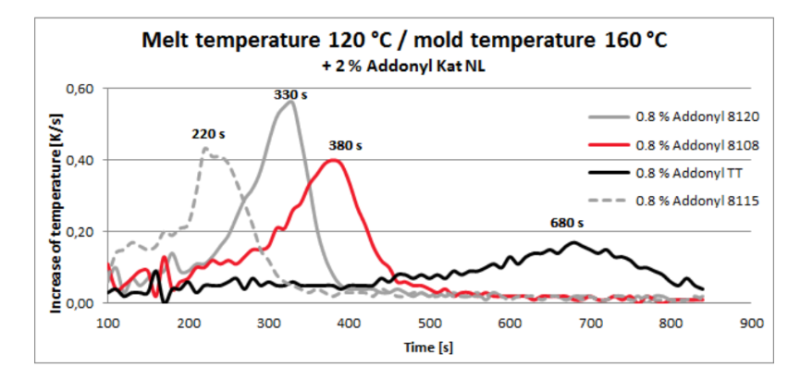Enhanced TDS
Identification & Functionality
- Chemical Family
- Product Code
- MITM09323
- Technologies
- Product Families
Features & Benefits
- Materials Features
- Product Features
- Addonyl® 8073 is a solid high-molecular-weight polyol.
- Addonyl® 8073 is used in rotomolding to prevent the formation of voids and pinholes. Furthermore, it also improves the impact value and the machinability of the obtained cast nylon.
Applications & Uses
- Applicable Processes
- Compatible Polymers & Resins
- Plastics & Elastomers Processing Methods
- Markets
- Applications
- Product Uses
- The reactivity of the polymerizing melt is influenced by various factors. We therefore advise against a concentration of > 2% p.b.w., because otherwise problems with the polymerization may occur.
- The product is easily soluble in molten caprolactam. The caprolactam melt containing the activator is susceptible to oxidation. Thus, we recommend working under inert gas.
Properties
- Physical Form
- Soluble In
Technical Details & Test Data
- Reactivity of Various Addonyl® activators
- The following diagram shows the reactivity of various Addonyl® activators, with the same weight dosing, subject to time:

Packaging & Availability
- Packaging Type
Principal Information
- Group Principal Number
- S000008
- Principal
Storage & Handling
- Storage Conditions
- If handled correctly, the product has a shelf-life of at least 24 months.
- A receiving inspection is recommended.
- The product should be stored in a cool, dry place.
- Once opened, containers should be resealed tightly after removal of product.
Other
- Appearance
- Colorless waxy flakes with weak inherent odor
- Color (SDS)
- Colorless
- Item Number
- Odor (SDS)
- Slight characteristic
- Other Hazards
- None known
- Temperature Control
- Yes
- USA/DOT UN Number
- Not Applicable
- Application Information
Value Units Test Method / Conditions Application Temperature 130.0-160.0 °C °C mold Dosage (Use Level) 0.3-2.0 %(W/W) %(W/W) - Chemical Properties
Value Units Test Method / Conditions Hydroxyl Value max. 7.0 mg KOH/g mg KOH/g - Physical Properties
Value Units Test Method / Conditions Melting Point 60.0 °C °C Moisture Content max. 0.5 % % Storage Temperature max. 122.0 °F °F - SDS Physical and Chemical Properties
Value Units Test Method / Conditions Bulk Density (SDS) 400.0-500.0 kg/m³ kg/m³ Decomposition Temperature (SDS) 360.0 °C °C Density (SDS) 1.2 g/cm³ g/cm³ Flash Point (SDS) 240.0 °C °C Closed Cup Flash Point (SDS) 240.0 °C °C DIN 51376 Ignition Temperature (SDS) min. 320.0 °C °C Kinematic Viscosity (SDS) 25.0-35.0 cm²/s cm²/s Log Partition Coefficient (Log Pow) (SDS) max. -1.0 - n-Octanol/Water Melting Point (SDS) 60.0 °C °C Viscosity (SDS) 2700.0-3500.0 mPa.s mPa.s pH (SDS) 5.0-7.0 - pH (SDS) 5.0-7.0 - concentration 10 w/w% - Shelf Life & Stability
Value Units Test Method / Conditions Shelf Life 24.0 mo mo
